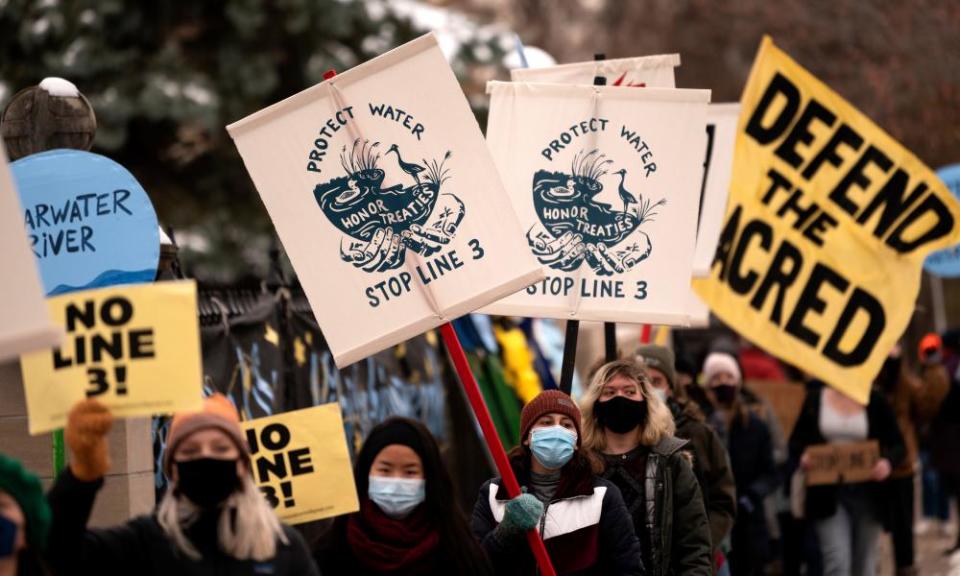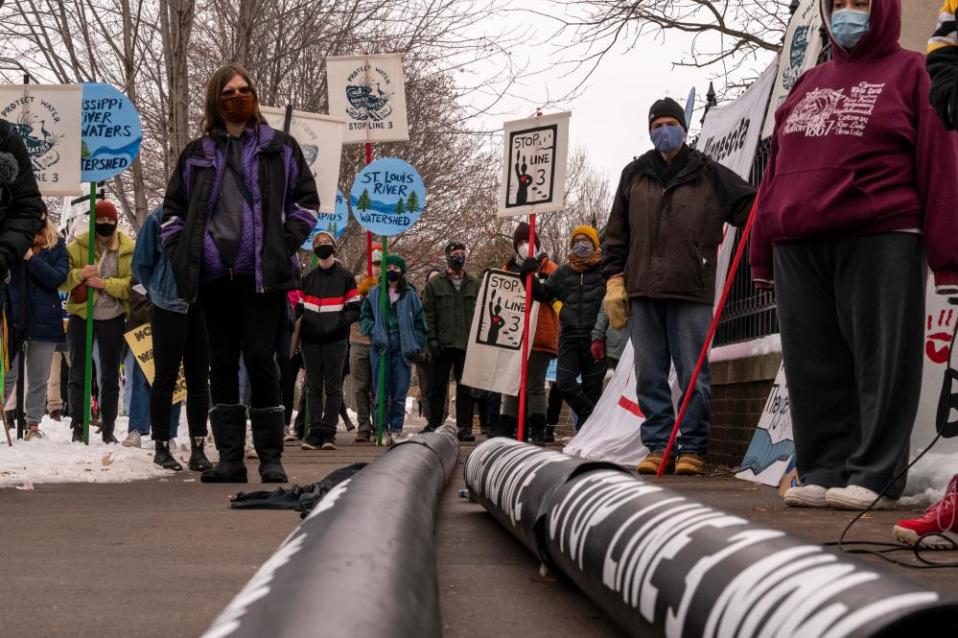A huge oil pipeline is coming to Minnesota—and with it the risk of Covid

As Covid-19 cases surge in Minnesota, an oil company is bringing in thousands of out-of-state workers to finish building a pipeline from Canada that will stretch hundreds of miles across the state.
Environmental advocates and Native American tribes have fought Enbridge Energy’s Line 3 proposal for years, and now medical professionals are joining in to plead with the governor to halt construction amid the pandemic.
Enbridge secured its final permits from the state this week, and workers are already arriving, although lawsuits are ongoing.
Related: Judge suspends Dakota Access pipeline over environmental concerns
In Aitkin county where construction is starting, a senior nurse at the Riverwood healthcare center said the staff is already struggling.
“Our nurses, we’re very stressed out. It’s taking more staff to take care of Covid patients, and we’re seeing a lot of our families and friends and our relatives that we’re caring for,” said the nurse, who asked to remain anonymous to protect her position. “We know within the next couple of weeks, it’s going to get bad again.”
Riverwood is a ‘critical access’ hospital, a designation for rural hospitals meant to improve healthcare access to small communities. It has 25 beds and 4 intensive care beds. The hospital has been trying to transfer the sickest patients to bigger facilities, but those hospitals are increasingly already at capacity.
Nearly 200 Minnesota health professionals are petitioning the governor’s office for an emergency stay of construction, arguing an influx of workers will increase community spread of Covid-19.
“Minnesota is currently facing a massive surge in Covid-19 cases. Our hospital capacity is limited and the resilience of our workforce is being challenged,” their petition reads. “A major outbreak in a rural area with limited healthcare capacity such as Aitkin county … will have ripple effects across our entire state healthcare infrastructure.”
Kristina Krohn, a hospitalist at the University of Minnesota medical school in Minneapolis who signed the petition, has worked as the triage doctor answering calls from small-town medical providers who need to transfer very sick patients. The arrival of workers in rural Minnesota makes her nervous for her 70-year-old parents, she said.
“If they get sick, I want a hospital bed available for them,” said Krohn, who spoke to the Guardian in her personal capacity and not on behalf of the university. “When we are encouraging people to not travel for Thanksgiving or Christmas, then I think we need to also not encourage large groups of people to travel for work that doesn’t have to be done right now.”
Following renewed complaints this week, Enbridge has updated its Covid-19 preparedness plan. In addition to regular testing, temperature checks, and masking and distancing requirements, the company is encouraging workers to avoid public spaces whenever possible. The company will increase to 4,000 employees – some local and some not – over four to six weeks, it said. Any sick contractors will be transported to hospitals close to their permanent residences if they need advanced care.
In a statement to the Guardian, Enbridge said safety is its top priority. Laalitha Surapaneni, a Minneapolis physician with the group Healthy Professionals for a Health Climate, countered that the updated plan isn’t sufficient and “shifts the burden of reducing Covid spread to individual workers”.
The Enbridge pipeline is being built alongside a smaller pipeline that it is meant to replace. The original line was built in the 1960s and is corroding, risking an oil spill. Enbridge has argued the project will create 6,500 direct and indirect local jobs over two years.

Shanai Matteson, a climate change advocate who lives next to one of the two sites where the pipeline will cross the Mississippi river, in Aitkin county, said she’s seen trucks with mostly out-of-state license plates.
“It seems insane to me that we would do this, especially looking at oil prices and the demand. It’s going down,” Matteson said. “So why are we putting our precious environment at risk and our public health at risk when it’s for something not even needed?”
The state’s department of commerce is also challenging the line, saying Enbridge hasn’t proved there is demand for the oil the pipeline would carry.
State energy regulators today will consider a separate request to halt the project while court battles are ongoing, from the Red Lake Band of Chippewa and the White Earth Band of Ojibwe. White Earth is also considering federal lawsuits over treaty rights.
Last month, a majority of members of an environmental justice advisory committee for the Minnesota Pollution Control Agency resigned in protest after the agency approved a key water quality permit for the pipeline.
People of color have disproportionately suffered during the pandemic. Native Americans in particular are four times more likely than white Americans to be hospitalized with Covid-19, according to the Centers for Disease Control.
“There is not a more egregious decision you could have made in the state of Minnesota right now. This pipeline is fucking rammed down throats of the native people,” said Winona LaDuke, an activist with Honor the Earth who lives and works on the White Earth reservation in northern Minnesota.
“Who’s going to be liable for the outbreak that kills, you know, 500 people? Who pays for that? Enbridge pays for that? Who’s going to take responsibility for that one?”

 Yahoo Movies
Yahoo Movies 